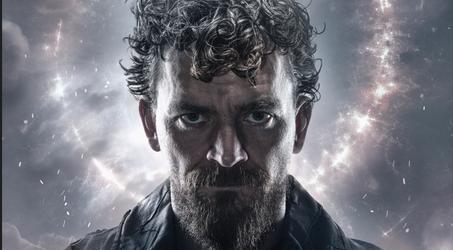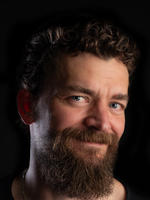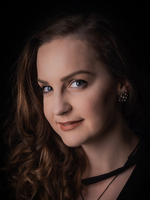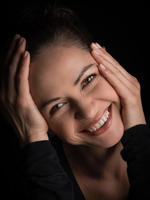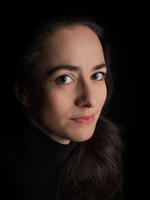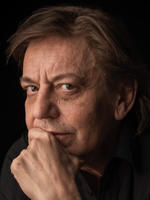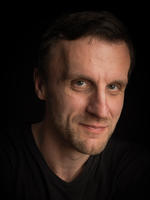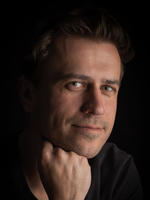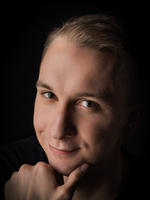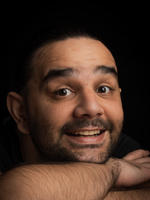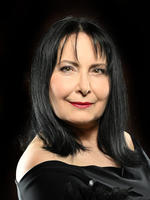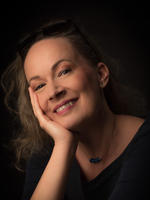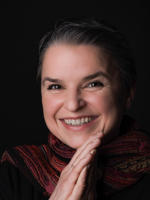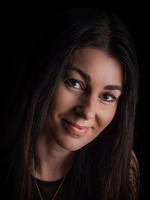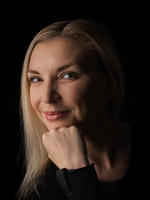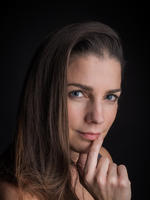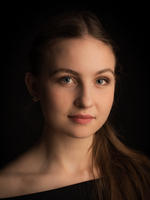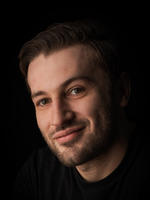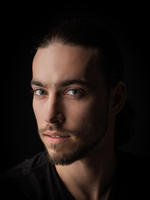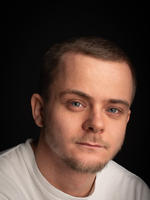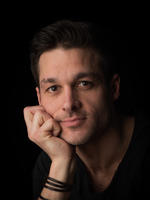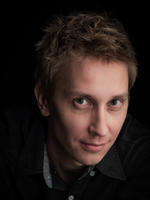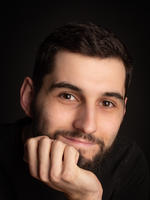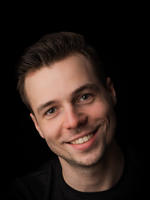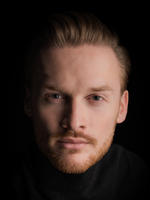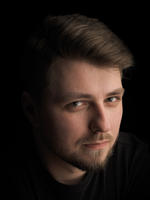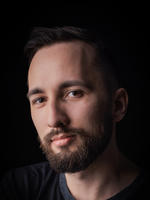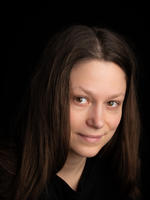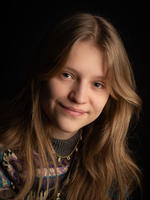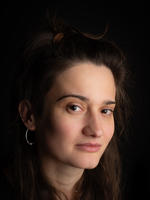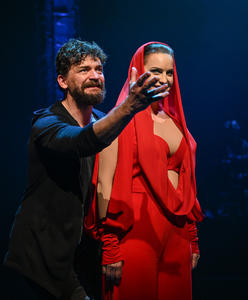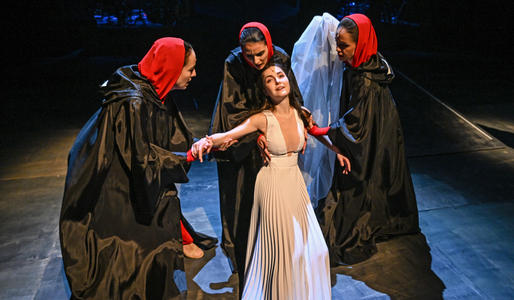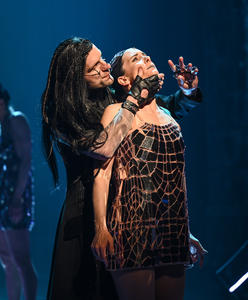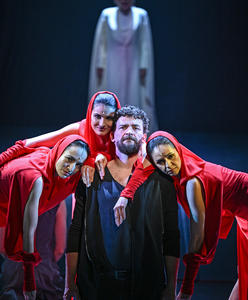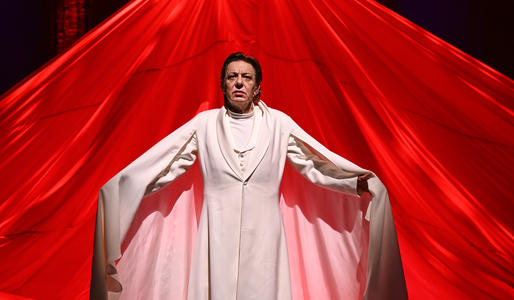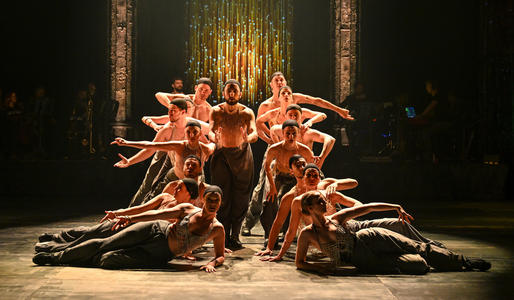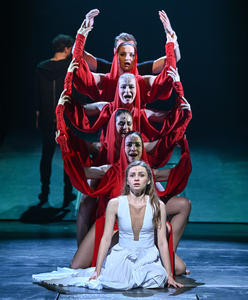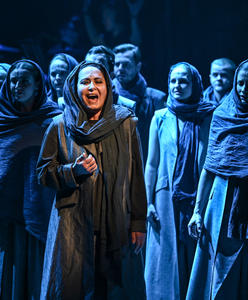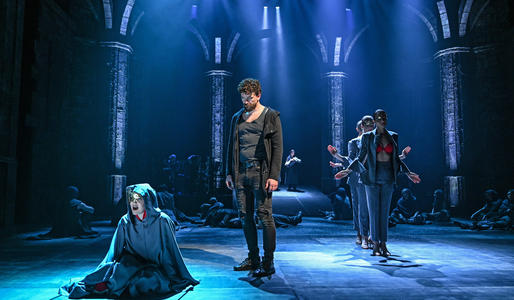Bastard: a cross between love and evil
Josef Meszáros 6. May 2024 zdroj www.scena.cz
(…)
This production of Bastard was staged by a new team. (…) Director Petr Gazdík tells a fairy tale with the use of modern stage technology that was not available thirty years ago. Petr Hloušek was responsible for the perfect visualisation. Thanks to his imagination, we find ourselves in a universe where good and evil collide.
(…) Petr Hloušek’s stage is framed by temple columns. There is a strong emphasis on spirituality and mysticism throughout the entire work. The old temple has a suggestion of an altar on its façade. God’s house is in turns transformed into Inferno, first and foremost with lasers that relentlessly crisscross the space with prevailing red and green colours.
Zdenek Merta’s music is multi-layered and structured into an Introduction, Kyrie eleison, Offertorium, Sanctus, Benedictus, Agnus Dei… For its time, the overall composition has a contemporary sound, from rock ballad to church choir. This musical variety is a real challenge for the seven-piece band. Bandleader Tony Marko leads the band with great bravura. We should also mention the fact that he also plays in the band himself and supplies various electronic sounds. All of this requires great discipline from the chorus, the band and the soloists.
Librettist Stanislav Moša plays primarily with the symbolism of words. The text of the oratorio literally beats to the music. But this magmatic current of words gives meaning to all of this and releases enormous heat. It represents an opportunity for individual performers to reveal the personalities of their characters and to lead the audience through the intimated story.
Dušan Vitázek’s Bastard is authentic in his search. He presents the character of a hard rocker who hides his gentle soul under a hard exterior. He struggles against his pitfalls, and unceremoniously deflects problems that he does not want to hear or resolve. Over the course of time, however, we are gradually witness to how they gnaw away at him and finally force him to act.
Viktória Matušovová’s Satan is mature and, above all, tough. Matušovová is capable of controlling her vocal range, but she also takes control of the stage physically. Their three shadows (Svetlana Jandová, Ivana Vaňková and Diana Velčická) submit to her entirely. All three enjoy their roles as a kind of vamp women. They gradually draw true love for one’s neighbour from Bastard by the transfusion of the venal and easy love of sin.
Esther Mertová’s Markétka is pure and faithful. She offers fragility and vulnerability. She does not believe that anyone could harm her. She may see the sins of the Bastard, but she believes that evil will turn into good. She cannot accept as normal anything but kind-hearted and self-sacrificing love.
The Homunculus, as played by Ondřej Studénka, is innovative – a robot equipped with artificial intelligence is born on stage. It gradually learns and politely offers the Bastard the harsh truth that is difficult to accept. According to him and the truth, the end of everything lies in expiration. In its robotic concept of reasoning, it is unable to accept the Kingdom of Heaven and the further continuation of spiritual life.
Jan Apolinař’s Holy Spirit is appropriately judicious and calm. Another source of light on the stage. Apolinař delivers well-phrased bel canto arias to the audience. His maturity and deliberation as an actor correspond to the nature of his character.
Rewarding returns
Josef Herman 4. May 2024 zdroj www.divadelninoviny.cz
(…) What else could the theatre have done to begin the celebrations of twenty years of the Music Theatre (which opened with the premiere of the musical Hair on 1 October 2004) than by reprising Bastard, even though it was, of course, performed on the small original stage at the time before the reconstruction by Miroslav Melena had been performed.
I recall fragments of a richly lit and costumed, but rather static performance of the oratorio, not unlike a staging of Bernstein’s Mass – which, I guess, had a fundamental influence on Moša – whereas the new production is based on a proclaimed visualisation, on a fascinating spectacle created by contemporary technology on the spacious stage of the Music Theatre. At that time, the themes were sung mainly in groups, which were extremely demanding by the way, while director Petr Gazdík has projected them into stunning images and the expressive actions of the soloists and company in an original choreography. There were also elements of circus, as if Bastard was to impress again as a programme piece with the contemporary means of expression of a perfectly mastered musical apparatus. I never developed much of a liking for the streams of words in Moša’s texts, let alone the ostentatious battle for Bastard’s soul between hell and heaven, Satan and the Holy Spirit, with the assistance of Goethe’s Margaret. But with its richly gestural musical setting, the work now and then offered an impressive ritual reflection on the most ordinary things of mankind. The title role was performed perfectly by Dušan Vitázek, taking over from Jan Apolenář, who now excels as the Holy Spirit. The Beggar was fabulously sung by Zora Jandová, and the current Margaret was her daughter Esther Mertová who gave a brilliant performance. An illustrative comparison of the former points of departure with the current possibilities aimed both then and now for the same musical theatre about the world and the people who live in it.
BLOG: Jaroslav Štěpaník’s Periodical (No. 79)
Jaroslav Štěpaník 24. April 2024 zdroj www.divadelninoviny.cz
(…) I see Bastard as a masterpiece by its two writers, with an equally outstanding directorial concept from Petr Gazdík with the co-operation of the entire team. It is probably impossible to imagine an actor from the ensemble better suited to the central role than Dušan Vitázek. A great performance. Esther Mertová was the perfect Markétka, repeatedly disappointed, but still loving, with a tender, lyrical and convincing performance. Satan was portrayed in unique and dramatic style by Viktória Matušovová. Her vocal jousts with her excellent counterpart in the form of the Holy Spirit, as played by Jan Apolenář, were wonderful and a real treat for the listener. The Homunculus is a little man, an artificial creation from the fantastical imagination of the alchemists, though here the creator is Bastard himself. Ondřej Studénka approached the role of Homunculus nicely. Its likeness was conceived in a fitting and contemporary manner as a robot equipped with artificial intelligence. Zora Jandová captured the attention with a distinctive singing performance in the minor role of the Beggar. A pivotal part in the production as a whole was played by other female and male roles in small groups as a significant dramatic device, underlining and underscoring the central plotline. The performance of the trio (Svetlana Janotová, Ivana Vaňková and Diana Velčická) accompanying and augmenting the role of Satan as his shadows was particularly suggestive and compelling.
An award should go to the small orchestra, conveniently placed right on the stage and providing the necessary energy. This time, a quartet of acrobats from Brno’s Circus LeGrando also joined the action. Recognition should go to Petr Hloušek for the set and projections, as well as to everyone else who provided effective accompaniment that complemented the performance with the means of modern contemporary theatre, not to forget the imaginative costumes by Andrea Kučerová.
This exceptional and dynamic production, dense in content and music, more like an opera, and going beyond a standard musical production, received an enthusiastic response from the audience at the premiere. It is certain to appeal to other visitors to the Music Theatre and should certainly interest those from the younger generations of friends of the theatre.
From sinful timelessness
Libor Kalina 23. April 2024 zdroj www.brnozurnal.cz
(…) The “visualised oratorio” Bastard (as the programme states) at the Music Theatre at Brno City Theatre (premiere 20 April 2024) is a fresh adaptation of the drama production of the same name (Brno City Theatre, 1993, 201 reprises). This musical jamboree, in which the audience does not always have to find its bearings at the very beginning, is composed of individual and more or less self-standing musical and dramatic numbers which are employed by the main characters to move the uncomplicated plot forwards. While the Homunculus, stylised in the realistic form of artificial intelligence (a consistent performance by Ondřej Studénka at the premiere) offers a critical perspective of Bastard’s various slip-ups, the character of Černoděr (Black Hole) seems to be something of an afterthought. Dirt and evil are everywhere around, almost as standard. Fair enough, but Oldřich Smysl could have sold it even more believably if he had been Bastard’s direct henchman in at least one scene rather than just his shadow. On the other hand, the drama is heightened to good effect by Satan in the moderately believable performance given by Viktória Matušovová and her fleet-footed shadows – the artfulness of the alluring Rusalka-esque sirens is accentuated by their magnificent costumes (Andrea Kučerová). Jan Apolenář transformed each of the Holy Spirit’s appearances into authentic apparitions. The engaging Esther Mertová coped well with the far from easy role of the ethereal and repeatedly betrayed Markétka. One of the strongest moments at the premiere was unquestionably Zora Jandová’s aria in the role of the Beggar. (…) Dušan Vitázek gave an excellent performance in the lead role. The orchestra, as an integral part of the set, which evokes the ruins of a Gothic temple, was particularly outstanding in the more intimate situations. (…)
A visual spectacle on a Faustian theme
Lukáš Dubský 22. April 2024 zdroj www.i-divadlo.cz/blogy
The musical production Bastard by Stanislav Moša and Zdenek Merta has returned to the stage of Brno City Theatre more than 30 years after its original premiere. This is a work with an atypical structure whose authors call a visualised oratorio.
(…) Such a complex form is not usual in the musical genre. Bastard does not offer a standard plot, but rather individual allegorical images. (…) First of all, we might mention Zdenek Merta’s music. Although I did not see the original production and am not a particular fan of the recording, Bastard impressed me with its unconventionality in terms of its music. It is highly variable, combining motifs of sacred music with a rock edge and featuring a number of strong motifs. Director Petr Gazdík has constructed the production as a magnificent visual spectacle, supported by Petr Hloušek’s set, which evokes a temple, and colourful costumes and featuring an aerial silk performance by acrobats. Bastard also offers a number of great performances. First and foremost, I must mention Esther Mertová, who once again displayed her precise singing technique and beautifully resonant voice in the role of Markétka, while also proving the member of the cast most able to overcome the limits of the libretto to humanise her character. Zora Jandová took advantage of an extremely limited opportunity (just a single song to be precise) to impress with her masterful yet sensitive singing in the role of the Beggar (she played Satan in the original production).
“Shadows” have been added to the character of Satan, with this role being divided among four actresses (Viktória Matušovová, Ivana Vaňková, Svetlana Janotová and Diana Velčická), and I enjoyed the interplay in their acting and singing.
The title role must be physically and emotionally demanding for Dušan Vitázek as it runs through the entire performance. His scenes are generally extremely tense emotionally. He employs his acting skill to create an arrogant personality whose own guilt gradually catches up with him. (…).

